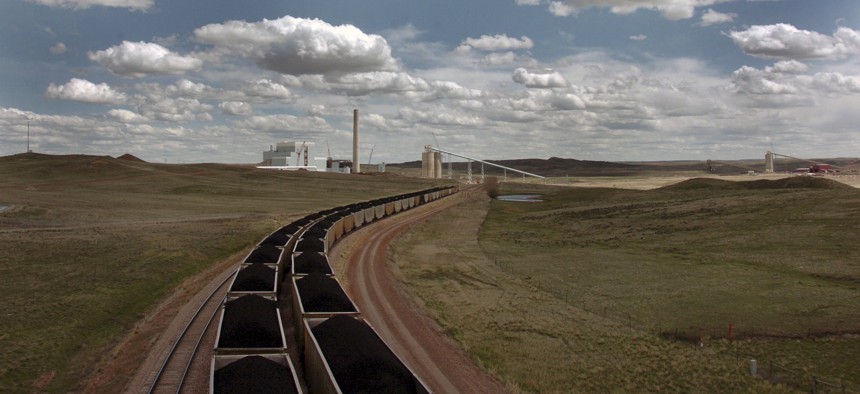AGs Argue Federal Railroad Law Shouldn’t Override State Permitting Power

A pair of coal trains idle near Gillette, Wyo. in 2010. Slack demand for coal in the U.S. in recent years has caused mines to look abroad for potential customers. AP Photo/Matthew Brown

Connecting state and local government leaders
Six Democratic attorneys general weighed in on a legal dispute about Washington state’s denial of environmental permits for a coal export facility.
A company that wants to build a massive coal export terminal along the Columbia River in Washington state has lodged multiple lawsuits in recent years over the state’s denial of environmental permits for the project.
This week, six Democratic attorneys general from other states weighed in on one of those cases. They’re arguing that a federal law governing the regulation of railroads should not override Washington’s authority to make decisions like it did denying the permits.
State officials in Washington say they didn't grant approvals for the terminal because it would have resulted in greater air pollution and other environmental harm.
“The Constitution vests in the states the power to provide for the general welfare of their residents,” said California Attorney General Xavier Becerra, whose office took the lead filing a friend of the court brief this week in the U.S. 9th Circuit Court of Appeals.
“Projects which harm the health and environment crucial to the welfare of the public are therefore subject to the states’ authority,” Becerra added. “The federal district court properly found that Washington state’s actions did not clash with any federal authority.”
Interest in the coal terminal dates back to at least 2012. As initially planned, the facility would be the largest of its kind in the U.S. It would provide a site where coal mined in Montana and Wyoming could be delivered by rail and then loaded onto boats bound for Asian markets.
Inland coal mines have sought new ways to send their product overseas as demand for coal here in the U.S. has softened over the past decade.
The company proposing the terminal, Lighthouse Resources, Inc., has a stake in coal mines in landlocked western states. In the 9th Circuit case, BNSF Railway Co. intervened. The railroad is in a position to transport coal to the terminal if it is ever built.
Broadly, Lighthouse contends that Washington state’s reasons for blocking the project, known as the Millennium Bulk Terminal, are rooted not in environmental permitting concerns, but on ideological opposition to exporting coal and the belief that it will contribute to global warming.
Part of the argument that Lighthouse and BNSF make in their appeal to the 9th Circuit is that a district court erred when it rejected claims the companies brought under the Interstate Commerce Commission Termination Act, a law that protects federal jurisdiction over railroads.
The companies say Washington’s rationale for denying a key water quality permit for the terminal hinged heavily on the potential for pollution from trains going in and out of the facility.
If the state were barred from considering the effects from trains when deciding on permits, Lighthouse says its permit applications would no longer face “the most prominent obstacles.”
But the district court ruled that the Interstate Commerce Commission Termination Act did not preempt the state’s authority in this situation. The court found that the state’s permitting decisions didn’t directly regulate a railroad.
This aspect of the case is where Becerra and the other Democratic attorneys general took an interest. They’re urging the appeals court to uphold the lower court decision.
Lighthouse, they contend, is trying to twist the federal law so it applies to them, even though the company is a railroad customer, not an actual railroad.
“That BNSF would have another customer and improve its financial viability but for Washington’s denial of the permits for Lighthouse’s Terminal does not ‘unreasonably burden’ rail transportation,” the attorneys general wrote in their brief.
A ruling in favor of the companies, and against Washington, on the ICCTA issue, they argue, “would impair the ability of states to carry out their police-power responsibilities over a wide array of industries, such as manufacturing, energy, and agriculture.”
Attorneys general from Maryland, Massachusetts, New Jersey, New York, and Oregon joined Becerra in signing onto the brief.
Bill Lucia is a Senior Reporter for Route Fifty and is based in Olympia, Washington.

NEXT STORY: What Happens When Community College Is Made Free





